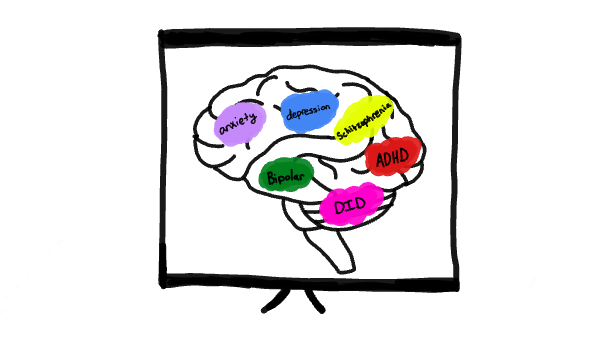The portrayal of mental health and illnesses in film and television
Visit Nami.org to learn more about mental health information as well as resources.
A woman is running through the streets in a hospital gown, having a mental breakdown. The audience watching this movie is enthralled in the generic “crazed woman breaks out of mental hospital” scenario.
Oftentimes, popular movies or shows gain attention through their controversy and unique story lines. Characters that are portrayed as more damaged or unhealthy mentally make viewers feel sad for them and continue watching to see what other tragedies occur in their life. The portrayal of some mental illnesses in movies or shows that are often popular is sometimes skewed.
In the hit show “Euphoria” which aired in 2019 and its second season is currently airing, streamed on HBO Max, the main character, Rue Bennet suffers from depression, anxiety, Attention Deficit Hyperactivity Disorder (ADHD), and Bipolar disorder. In season 1 episode 7 viewers watch as Rue goes through a manic episode while trying to figure out what is happening to the people around her.
According to The National Alliance on Mental Illness (NAMI), Bipolar disorder is a mental illness that causes extreme shifts in mood, usually from episodes of depression to manic states.
While “Euphoria” does express how Rue is suffering from mental disorders it shows them in a fun and comical way that can give the viewer a more positive outlook on someone who is clearly suffering.
Sophomore Michelina Spano explains her views on “Euphoria”’s portrayal of mental illness and health.
“I think it touches on important subjects, but the way they show mental illnesses isn’t correct. They show them but almost romanticize them too,” Spano said.
Other movies like “Split” give their own interpretations of mental illness, but from a viewer’s pleasure standpoint. “Split” is a thriller where the main character has Dissociative Identity Disorder (DID), but the film refers to it as Multiple Personality Disorder, a term no longer used. The character’s illness is used solely for purposes of view enjoyment, yet still romanticizes this illness and shows him as a monster.
In fact, one of the many personalities that actor James McAvoy portrays is called “The Beast”.
Betty Buckly who plays Dr. Karen Fletcher speaks about this personality during the movie.
“An individual with multiple personalities can change their body chemistry with their thoughts,” Dr. Karen Fletcher said.
This is incorrect and only used to scare the audience. People with DID cannot change their body chemistry and climb on walls, as seen in the film. While the movie may be interesting and one may think they are seeing a psychological thriller, the reality is, this movie only uses a serious illness to make someone look crazy enough to make viewers interested.
Dr. Agnes Katherine Costello of Northwestern Medicine speaks on the dangers of incorrect portrayals of mental health and illnesses.
“But the truth is, not all depictions of mental health in the media are healthy. In fact, many TV shows and films have an alarmingly poor grasp on what it really means to have a mental illness and perpetuate harmful stereotypes that feed the stigmas attached to it,” Costello said.
The film “Black Swan” also uses a serious illness to portray Natalie Portman’s character as out of her mind. The film focuses on a ballerina who loses sense of reality as she is fighting against herself for the spot in the ballet. The character suffers from schizophrenia and while her outbreaks seem like one of a severe mental illness, some say that it isn’t correct.
ABC’s Susan Donaldson James interviewed Dr. Steve Lamberti about his thoughts on the film.
“But speaking as a psychiatrist, Lamberti said the film did not accurately depict schizophrenia, as has been widely speculated, but ‘does present a reasonable portrait of psychosis,’” James said.
According to NAMI, some movies that depict mental health the best in their opinion are: “Rain Man”, “What About Bob”, “As Good As it Gets”, “A Beautiful Mind”, “Silver Linings Playbook”, “The Skeleton Twins” and even Disney’s “Inside Out”.
“Silver Linings Playbook” shows Bipolar disorder in the correct way according to NAMI. It follows the story of Bradley Cooper’s Character Pat Solatano and his Bipolar disorder journey.
Laura Greenstein wrote this article about the top movies and spoke on this one.
“‘Silver Linings Playbook’ represents the range of emotion that often occurs within someone who lives with Bipolar disorder in a way that is both real and riveting,” said Greenstein.
Most of the time, movies and tv are meant for enjoyment and can use dramatic effects to give one the best viewing experience. Although some of these movies or shows are popular, many don’t give accurate portrayals of mental health and illnesses. Many films and shows can still be popular and win awards while portraying these illnesses in the correct way.
Promoting the accuracy of these illnesses helps those struggling not feel alone and creates a safer space to de-stigmatize mental health and illnesses.


